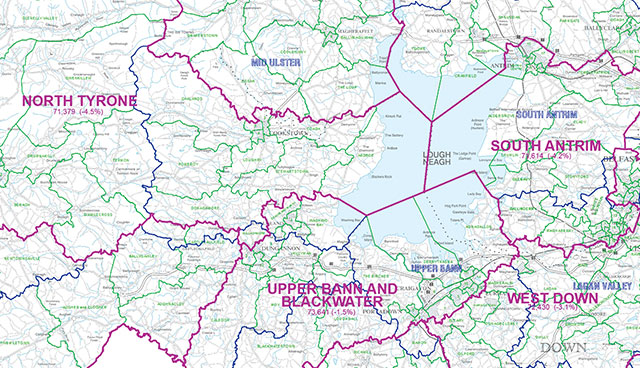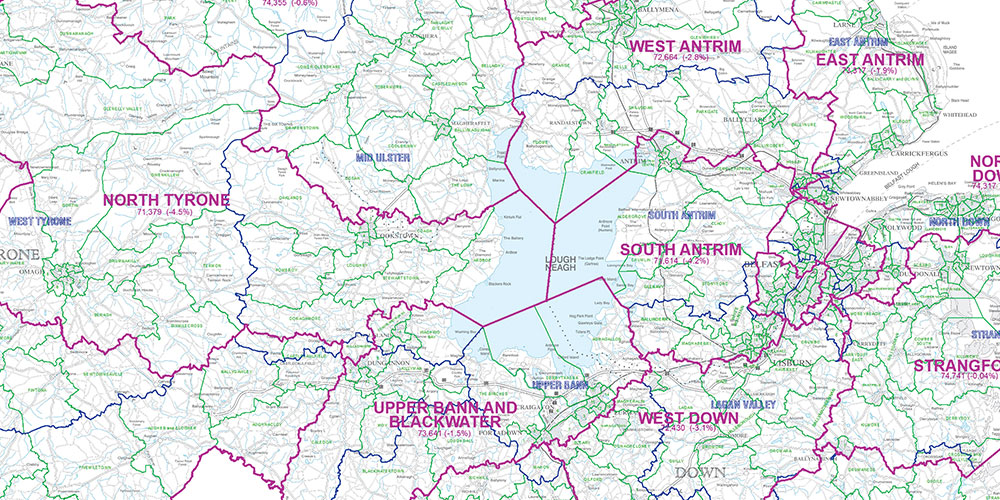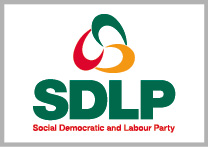Constituency proposals know no bounds


Having completed the Secondary Consultation phase of the 2018 Review of Parliamentary Constituencies, later than anticipated, the Boundary Commission has expressed confidence that it will meet the September 2018 statutory deadline to make final recommendations to Parliament.
Overall, the main political parties responded to the Commission’s provisional proposals with varying degrees of suggested adjustments – some radical. While the UUP, SDLP and Alliance acknowledged the difficult nature of the review undertaken, the DUP were less conciliatory, stressing: “The DUP has consistently criticised the present legislation as much more likely to produce poor boundaries and the
Commission’s proposals appear to have gone out of their way to fulfil our concerns.” Sinn Féin, meanwhile, did not make a party submission during the first consultation process.

The DUP submission conveys a sense of complete dissatisfaction with the provisional proposals and urges the Commission to rethink both the
se and its overall approach. The basis of this opposition lies in the perception that “the proposals would produce an unrepresentative political result that would have the potential to have far reaching and negative political consequences for the constitutional stability of Northern Ireland”.
The party makes several criticisms of the Commission’s approach, including:
• the blank canvas adopted by the commission when redrawing boundaries;
• the decision to start with the Belfast seat reduction and work outwards;
• the misapplication of boundary law (use of Belfast City Council boundaries) applicable in Great Britain but not Northern Ireland; and
• the failure to apply a provision to compensate for the potential impact on the average size of constituencies in Northern Ireland under Rule
Seven of the Parliamentary Voting System and Constituencies Act (2011).
As such, the DUP submits that “the Commission has failed the people of Northern Ireland”, emphasising that almost a quarter of voters would transition into new constituencies under the proposals.
In relation to Belfast, the party asserts that council boundaries are not an accurate reflection of the city, its growth and its contribution to “the overall success of Northern Ireland as a region”. “That is why it is so alarming that the Commission is attempting to undermine the role of our capital city by contracting it beyond any recognition”. The DUP is also critical of the proposed names for the new constituencies which do not include the use of either North Antrim or Londonderry.
The alternative proposals outlined by the party advocate a scenario in which would see 40 per cent less movement of the electors between constituencies compared with the Commission’s provisional plans. This, it argues, would also mitigate for the “13 significant breaches of local identity… and the number of constituencies with their urban centres on the periphery of the constituency”.

The UUP expressed disappointment at the proposed changes, which it suggests are “unnecessarily drastic and in excess of what is required”. Anticipating that significant changes to constituencies would be limited to Belfast, the party submission notes, “a wholesale redrawing of nearly all remaining constituencies and the creation of six entirely new ones has shocked us”.
On the reduction of Belfast constituencies, reiterating previously stated disapproval of the new council boundaries (“It is obvious to everyone that the natural boundaries of Belfast extend far beyond the City Council boundary.”), the party contends: “It is difficult to realistically argue for four Belfast parliamentary constituencies without also arguing for the extension of the City Council to the same or similar boundaries.”
The party’s submission also acknowledges: “In your provisional proposals, the reduction of Belfast to three seats does help elsewhere.” Arguing that existing boundaries beyond greater Belfast should be retained to the greatest extent possible, it expresses regret that Belfast appears to be the sole area in which council boundaries appear to have been adhered to.
However, outside of the south and the east, the UUP again expresses exasperation with the changes. In South Antrim, “a constituency which already falls within the acceptable parameters”, a change involving 30 wards is proposed.
UUP’s own proposals are anticipated to impact upon 13 per cent of the electorate (160,000) in comparison with the Commission’s proposals, under which 30 per cent (360,000) would be affected. As a method of mitigating against the impairment of local ties, the party suggests that Rule Seven of the Parliamentary Voting System and Constituencies Act (2011) should be applied in West Tyrone/Foyle,
 Like both the DUP and the UUP, the SDLP submission to the Commission references the 2011 Act. Arguing that the uniqueness of Northern Ireland necessitates the utilisation of procedures which “allow for regional definitions of the quota range”, the party contends that the minimum regional threshold would lie just outside of the current electoral average and within the margin of error.
Like both the DUP and the UUP, the SDLP submission to the Commission references the 2011 Act. Arguing that the uniqueness of Northern Ireland necessitates the utilisation of procedures which “allow for regional definitions of the quota range”, the party contends that the minimum regional threshold would lie just outside of the current electoral average and within the margin of error.
Most particularly, the SDLP articulates apprehension in relation to the proposals for Belfast. “We are alarmed that the most immediately evident aspect of this reduction is the radical redrawing of boundaries within Belfast… The proposed reduction in representation would inevitably lead to a diminution in the standing and influence of Belfast as a major city and a regional capital.”
In its own proposals, the party argues: “The designation of boundaries for Belfast City Council to inform 10 other council designations was a very different exercise than using Belfast council boundaries to inform the division of Belfast city.” As such, it makes the case that as Belfast continues to grow, both spatially and in density, there is a more compelling argument to expand the four existing Belfast constituencies outwards beyond the council demarcation, thereby avoiding “damage to Belfast’s status”.
Overall, the SDLP’s central tenet is the retention of 18 constituencies, suggesting that the Commission’s logic in proposing a reduction to 17 is flawed and that there is a “strong likelihood of having to increase them by one at the next review”.
 Speaking at the Belfast public hearing of the provisional proposals, Sinn Féin’s Alex Maskey expressed the view that his party was “broadly content… subject to local areas having their own considered view”.
Speaking at the Belfast public hearing of the provisional proposals, Sinn Féin’s Alex Maskey expressed the view that his party was “broadly content… subject to local areas having their own considered view”.
However, he outlined the party’s concern that data from the December 2015 electoral register formed the basis for drawing the new constituencies rather than census data “which is standard international practice”.
Referencing the Scottish precedent, Sinn Féin has voiced its preference for powers relating to Assembly and Local Government elections to be devolved to local representatives and for the establishment of a boundary commission dealing exclusively with the Assembly constituencies.
 Alliance is largely supportive of the provisional proposals. The party is “in full agreement” with the proposed reduction of Belfast to a three-seat constituency and contends that, as Belfast is now significantly below four quotas, any attempts to retain its four-seat status would necessitate an extension beyond the outer suburbs, subsequently “undermining the identity of the capital city”.
Alliance is largely supportive of the provisional proposals. The party is “in full agreement” with the proposed reduction of Belfast to a three-seat constituency and contends that, as Belfast is now significantly below four quotas, any attempts to retain its four-seat status would necessitate an extension beyond the outer suburbs, subsequently “undermining the identity of the capital city”.
Consequently, the party suggests that the reduction from 18 to 17 constituencies will inevitably result in significant change across the board. As such, “the priority must be placed on producing 17 stable boundaries that can withstand future reviews and minimise future change, therefore protecting local ties”.
Like the other parties, Alliance expresses apprehension that compulsory five-year reviews have the potential to create a cycle of substantial disruption to boundaries within what is a relatively small geographic region.
Similarly, it proffers a “better solution” for Lisburn, Newtownabbey, Craigavon and Dungannon, whose identities, it argues, did not receive sufficient protection within the provisional proposals. The party’s response also suggests minor changes based within the greater Belfast area to “improve geographical considerations, local ties and the future stability of the boundaries”.





